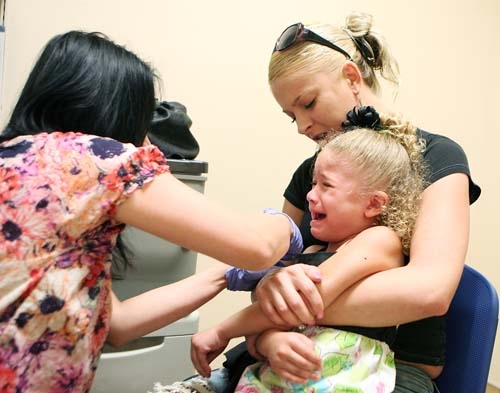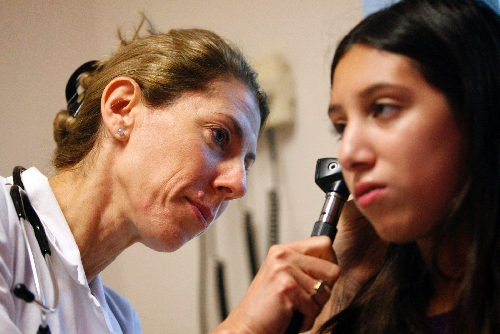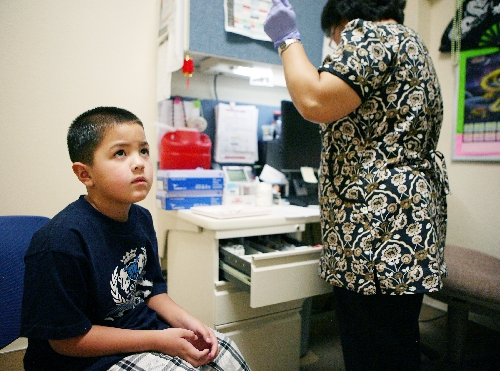Exams, vaccines get Las Vegas kids ready for school
If 4-year-old Taylor Spagnualo moved any slower toward the nurse's office, she might be mistaken for a statue of a pretty little girl that the Southern Nevada Health District could have placed in the lobby of its immunization clinic in eastern Las Vegas.
In fact, the only time the petrified child moved down the hallway at all is when her mother gave her loving nudges.
"Honey, you have to have your shots to start school," Jazzmin Spagnualo whispered to her daughter.
At the word "shots," the tears began.
"Oh, no," Taylor's mother said as she hugged her daughter and picked her up. "Now you're going to make me cry."
Yet another slightly uncomfortable, but necessary, rite of passage for little ones and their parents as the first day of kindergarten approaches.
Similar scenes will play out as many as 15,000 times this month - nurse Jocelyn Castillo gave a crying Taylor all her shots in less than 30 seconds - right up until schools open in the Clark County School District on Aug. 27, said JoAnn Rupiper, a nursing supervisor with the health district.
"Inevitably," Rupiper said, "people wait until the last minute."
Given that scientists say one of the greatest public health victories of the past century was the discovery of safe and effective vaccines - millions of lives have been saved and millions more people freed from the threat of killer diseases - it comes as little surprise to most parents in Nevada that children must have the appropriate vaccinations to attend a public, charter or private school unless they're excused for medical or religious reasons.
GOING BEYOND THE REQUIREMENTS
What may come as a surprise to some parents, according to Dr. Lisa Glasser, is that what isn't required for a child to attend school - an annual wellness visit with a pediatrician - is just as important as up-to-date vaccinations.
"It's important that we check to see if a child is developing on schedule - physically, verbally, mentally, intellectually," she said, noting that the American Academy of Pediatrics recommends an annual wellness visit, which involves a complete physical, through age 18.
"If we catch a problem early, often we can do something about it so it doesn't interfere with a child's education," the pediatrician said. "I can refer someone to a specialist, if need be."
Too often, she said, parents tend to think a visit with a doctor is just about an illness or vaccinations.
Problems with eyesight, for example, that can cause reading problems can be caught and corrected early. Ditto for hearing difficulties.
"Once a child is school age a doctor tries to engage the child during a wellness visit," she said, with the physician trying to find out what the youngster's sleep, eating and exercise patterns are. "We need to promote good behaviors, like having a child floss and go to the dentist every six months."
More and more often she sees children who are too sedentary, who aren't getting enough sleep, who aren't eating properly.
"The sooner we can change that, the better," she said. "We need the child and the parents to work on the change together. We need to talk about proper diets, how much sleep and exercise is enough. What the family can do for positive change. "
If poor behaviors aren't caught early, what often occurs is obesity - the childhood epidemic sweeping the nation.
Because of obesity, diabetes, high blood pressure and heart problems are more and more common in children, Glasser said.
'KEEP UP THE GOOD WORK'
Recently, in her Positively Kids medical office in eastern Las Vegas, Glasser gave a wellness visit to 12-year-old Bianca Chavez.
"You're looking good," she told the seventh-grader during an examination that dealt with the child's heart, blood pressure, eyes and ears. "Not even any wax in your ears."
It is important at such visits, Glasser said, that a physician encourage youngsters to "keep up the good work."
"This shouldn't only be about the negative," Glasser said.
Few people are as passionate about vaccinations as Glasser. She has blamed Andrew Wakefield, a man who was stripped of his medical license in Great Britain, for creating needless fear about vaccinations.
In 1998, Wakefield published a study in the prestigious medical journal The Lancet that purported to show a connection between the mumps, measles and rubella vaccine and autism. Vaccination rates around the world plummeted. Childhood diseases started to escalate for the first time in years.
Then, in 2010, after years of investigation, authorities found Wakefield had faked the data as part of a scheme to make money off new medical testing. The Lancet retracted the physicians's findings.
"It appears that parents now understand what happened and are positively moving forward, not fighting what is best for their children," Glasser said.
That translates to Nevada parents or guardians of a child submitting to school officials a record showing that a child entering kindergarten or transferring into a school has been immunized and has received proper boosters for: diphtheria, tetanus, pertussis (whooping cough), poliomyelitis, rubella, measles, mumps, hepatitis A, hepatitis B and varicella (chickenpox).
"We're not seeing many parents trying to fight the vaccination requirements for school," said Diana Taylor, head nurse for the Clark County School District.
Government records show that 82 children were exempted from vaccinations in Southern Nevada in 2011, when the Clark County School District had about 300,000 students.
PLANNING MAKES A DIFFERENCE
Should a child not follow the right shot timetable, which interferes with immunity, he ends up having to repeat the entire process.
"He had to start over his hepatitis shots because he didn't get them right," said Christine Cabrera, who watched her 6-year-old son Dominic grimace as he received a shot at the health district's eastern clinic that was necessary for him to return to school.
"That wasn't too hard," the boy said, rubbing his arm.
No child can enter the seventh grade without receiving the T-dap vaccine, which affords more immunity against tetanus, diphtheria and acellular pertussis.
Twelve-year-old Skylar Roberts, who will attend Lied Middle School this fall, was happy to receive her T-dap vaccination at the health district.
She only wishes there had been a vaccination available so her younger sister Chloe hadn't come down with leukemia.
Though Chloe, 6, is fine now, her long chemotherapy fight against the cancer made an impression on Skylar.
"I want to help kids, so I'm going to become a pediatric oncologist," she said. "I hope we could come up with vaccination against cancer. It would be easier to help kids from getting sick."
It is inevitable, of course, that children will develop medical conditions during their school-age years.
And some will need to take medication for their conditions at school.
Before school begins, parents should check out policies for children taking medication at school at www.ccsd.net/ or call school officials, said Clark County School District nurse Taylor.
"We want as few misunderstandings and confusion as possible," she said.
Parents of children up to fifth grade must leave medication in their child's health office, Taylor noted. Personnel there will dispense it.
With the written permission of a parent or guardian, students in grades six through 12 may take medicines themselves, except for controlled substances such as codeine or morphine - school personnel must still administer such medicines.
Prescription medication must be kept in the labeled container, which includes the name of the student and the prescribed dosage.
Under no circumstances may a student provide medication to another student.
When it comes to health issues for children and school - ranging from scheduling vaccinations to taking medications to campus - Taylor has a reminder for parents.
"A little planning," she said, "goes a long way."
Contact reporter Paul Harasim at pharasim@review journal.com or 702-387-2908.
HEALTH DISTRICT VACCINATIONS
The health district will offer back-to-school immunizations at area malls:
Day: Aug. 11
Time: 10 a.m.-3 p.m
Location: Meadows mall, 4300 Meadows Lane
Day: Aug. 18
Time: 10 a.m.-3 p.m.
Location: Boulevard Mall, 3528 S. Maryland Parkway
Day: Aug. 25
Time: 10 a.m.-3 p.m.
Location: Galleria at Sunset mall, 1300 W. Sunset Road
For more information about health district vaccinations, call 759-0850 or visit SNHD.info.



















